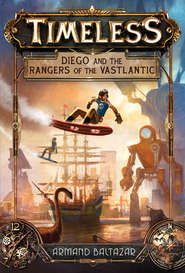
Полная версия:
Diego and the Rangers of the Vastlantic

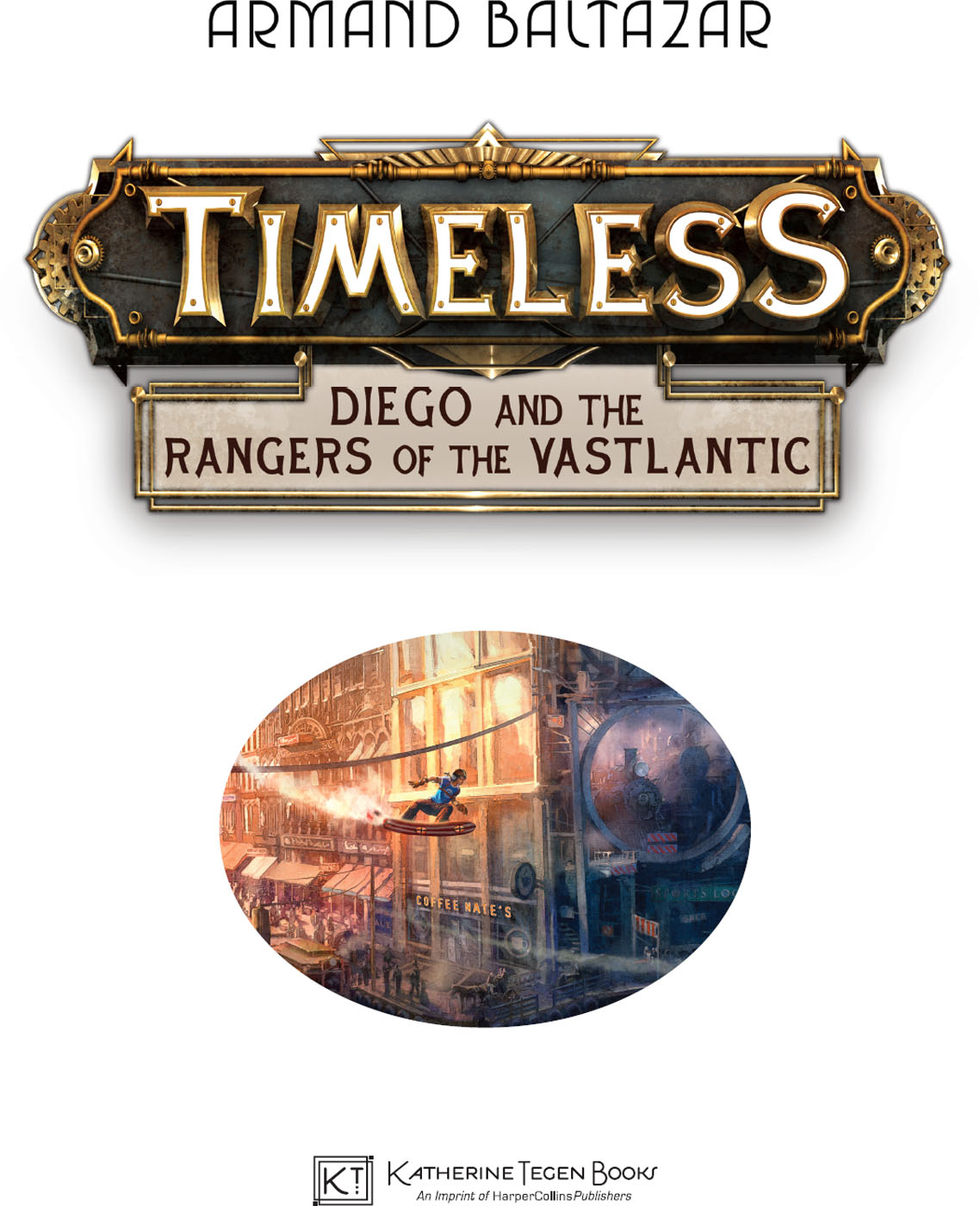
Copyright

Published in the United States of America by Katherine Tegen Books, an imprint of HarperCollinsPublishers
Published simultaneously in Great Britain by HarperCollins Children’s Books, a division of HarperCollinsPublishers Ltd
TIMELESS: DIEGO AND THE RANGERS OF THE VASTLANTIC. Copyright © 2017 by Armand Baltazar. All rights reserved under International and Pan-American Copyright Conventions. By payment of the required fees, you have been granted the nonexclusive, nontransferable right to access and read the text of this e-book on-screen. No part of this text may be reproduced, transmitted, downloaded, decompiled, reverse-engineered, or stored in or introduced into any information storage and retrieval system, in any form or by any means, whether electronic or mechanical, now known or hereafter invented, without the express written permission of HarperCollins e-books.
www.harpercollinschildrens.com

FIRST EDITION
Source ISBN: 9780008258955
Ebook Edition © September 2017 ISBN 9780008258962
Version: 2017-09-27
Dedication
For Dylan & Sharon Baltazar
and my friend
Kevyn Lee Wallace
Contents
1 Copyright
2 Dedication
3 Contents
4 Prologue
5 Part One: A World Remade Chapter One: A Dream of Flight Chapter Two: The Riberas of New Chicago Chapter Three: A Workshop of Wonders Chapter Four: Where Giants and Monsters Be Chapter Five: Serpents and Soldiers Chapter Six: Streets of Fire
6 Part Two: The Rangers of the Vastlantic Chapter Seven: Pirates and Stowaways Chapter Eight: Trials at Sea Chapter Nine: Those Who Help Themselves Chapter Ten: Maker’s Sight Chapter Eleven: There Be Dragons Chapter Twelve: The Magellan Chapter Thirteen: The Captain Chapter Fourteen: Diego and Lucy Chapter Fifteen: Monsters of Sea and Air Chapter Sixteen: Volcambria Chapter Seventeen: Turtles and Tactics Chapter Eighteen: An Oath Before the Storm Chapter Nineteen: What the World Can Be Chapter Twenty: Games of War and Jubilation
7 Part Three: Until It Turns No More Chapter Twenty-One: Where All Paths Lead Chapter Twenty-Two: The Battle at Yorktown Chapter Twenty-Three: Fury and Love Chapter Twenty-Four: Path and the Promise Chapter Twenty-Five: One Destiny Divided Chapter Twenty-Six: A Dream Changed
8 Epilogue
9 Acknowledgments
10 About the Author
11 Credits
12 About the Publisher
GuideCoverContentsChapter 1
ii iii iv v vi vii viii ix x xi xii xiii xiv xv 2 3 4 5 6 7 8 9 10 11 12 13 14 15 16 17 18 19 20 21 22 23 24 25 26 27 28 29 30 31 32 33 34 35 36 37 38 39 40 41 42 43 44 45 46 47 48 49 50 51 52 53 54 55 56 57 58 59 60 61 62 63 64 65 66 67 68 69 70 71 72 73 74 75 76 77 78 79 80 81 82 83 84 85 86 87 88 89 90 91 92 93 94 95 96 97 98 99 100 101 102 103 104 105 106 107 108 109 110 111 112 113 114 115 116 117 118 119 120 121 122 123 124 125 126 127 128 129 130 131 132 133 134 135 136 137 138 139 140 141 142 143 144 145 146 147 148 149 150 151 152 153 154 155 156 157 158 159 160 161 162 163 164 165 166 167 168 169 170 171 172 173 174 175 176 177 178 179 180 181 182 183 184 185 186 187 188 189 190 191 194 195 196 197 198 199 200 201 202 203 204 205 206 207 208 209 210 211 212 213 214 215 216 217 218 219 220 221 222 223 224 225 226 227 228 229 230 231 232 233 234 235 236 237 238 239 240 241 242 243 244 245 246 247 248 249 250 251 252 253 254 255 256 257 258 259 260 261 262 263 264 265 266 267 268 269 270 271 272 273 274 275 276 277 278 279 280 281 282 283 284 285 286 287 288 289 290 291 292 293 294 295 296 297 298 299 300 301 302 303 304 305 306 307 308 309 310 311 312 313 314 315 316 317 318 319 320 321 322 323 324 325 326 327 328 329 330 331 332 333 334 335 336 337 338 339 340 341 342 343 344 345 346 347 348 349 350 351 352 353 354 355 356 357 358 359 360 361 362 363 364 365 366 367 368 369 370 371 372 373 374 375 376 377 378 379 380 381 382 383 384 385 386 387 388 389 390 391 392 393 394 395 396 397 398 399 400 401 402 403 404 405 406 407 408 409 410 411 412 413 414 415 416 417 418 419 420 421 422 423 424 425 426 427 428 429 430 431 432 433 434 435 436 437 438 439 440 441 442 443 444 445 446 447 448 449 450 451 452 453 454 455 456 457 458 459 460 461 462 463 464 465 466 467 468 469 470 471 472 473 474 475 476 477 478 484 485 486 487 488 489 490 491 492 493 494 495 496 497 498 499 500 501 502 503 504 505 506 507 508 509 510 511 512 513 514 515 516 517 518 519 520 521 522 523 524 525 526 527 528 529 530 531 532 533 534 535 536 537 538 539 540 541 542 543 544 545 546 547 548 549 550 551 552 553 554 555 556 557 558 559 560 561 562 563 564 565 566 567 568 569 570 571 572 573 574 575 576 577 578 579 580 581 582 583 584 585 586 587 588 589 590 591 592 593 594 595 596 597 598 599 600 601 602 603 604 605 606 607 608

Prologue
Our world did not end the way you might expect. It wasn’t caused by any of the things you hear so much about today: the wars, the unrest, the changing climate. It wasn’t our arrogance, our pride, our selfishness. No, in the end, it was our creativity and brilliance. We thought we were making history by changing the future.
Turns out, we did both.
It came from beyond the stars, a cosmic event we could never have predicted, a rupturing of the space-time continuum that tore apart our entire existence. Not just our present, but our past, our future—everything that humans had been or would be. Gone. And what remained was a void, echoing with the faint whispers of a world that no longer existed.
But that was not the end.
Humankind was granted a second chance.
Out of the great silence, the earth was reborn, but like nothing we had ever fathomed. Dinosaurs roamed the great plains beside woolly mammoths and buffalo herds a million strong. Great steamships and ancient sailboats crossed the harbors among the legs of towering robots. The past, the present, the future—all thrown together. The continents reshaped, oceans re-formed, and mountains sculpted anew. This was the world after the Time Collision.
The hundred million or so humans who survived the cataclysm came from all points in time and found themselves scattered across the planet. The people of the civilized past were called Steam Timers, the people from the in-between times were called Mid Timers, and the people from the future came to be called the Elders. As these refugees from different eras struggled to survive in a dangerous world without order, conflict was inevitable. It was not long before this savage yet beautiful new landscape became a backdrop for war.

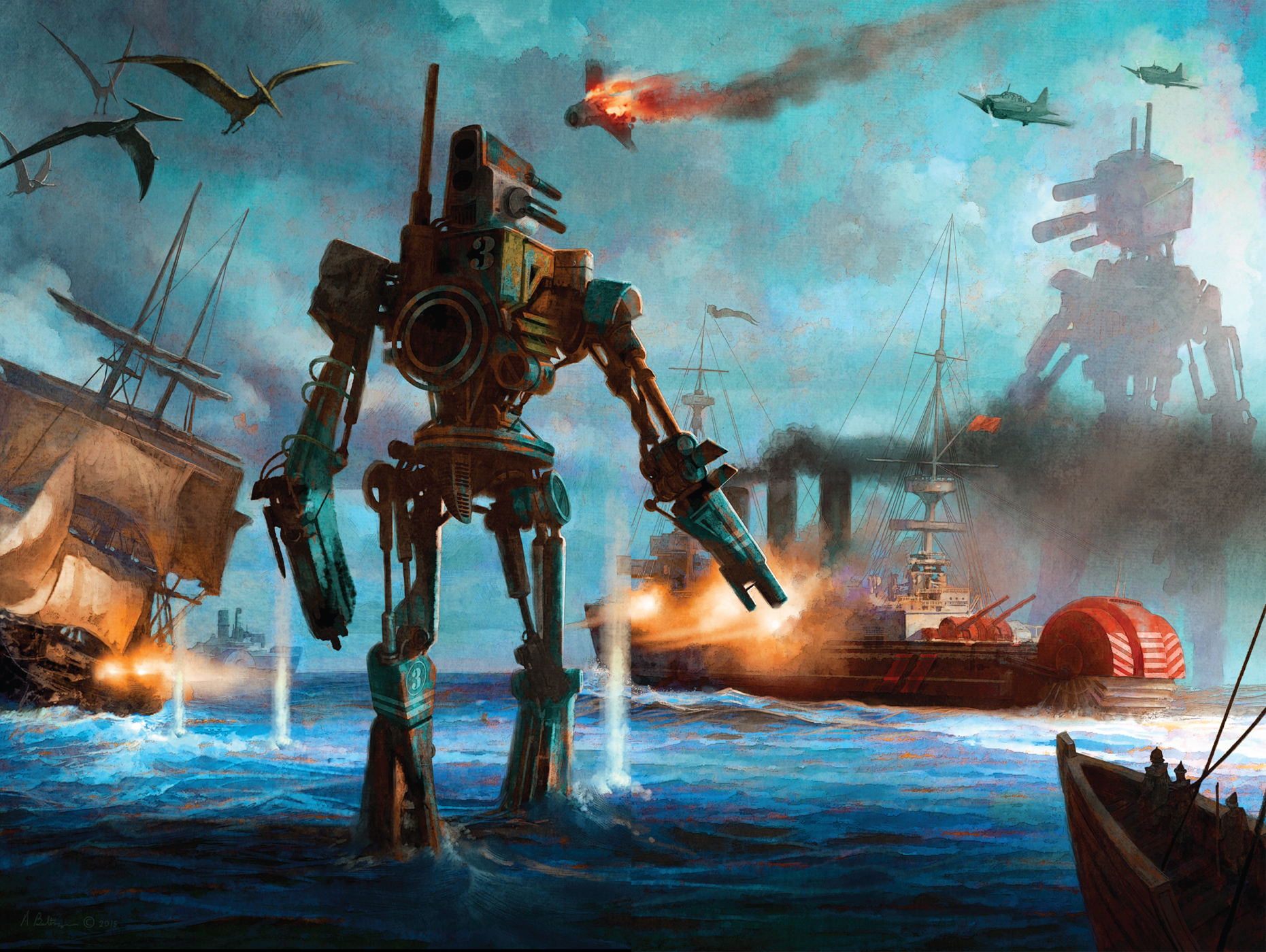


After years of fighting, the desperate people finally saw the pointlessness of hurting one another and realized they needed to work together. They declared an end to what came to be known as the Chronos War and grudgingly united to form governments, laws, and communities.
Their fragile peace allowed the surviving cities to rebuild and countries to be remade. Children were born, and the mysteries and wonders of this new world were explored.
But the darkness had not been vanquished. Despite all of humanity’s efforts, there were still those roaming the undiscovered wilds who would never submit to peace and order, and who would strike down anyone who stood between them and the power . . .

. . . to make the world their own.
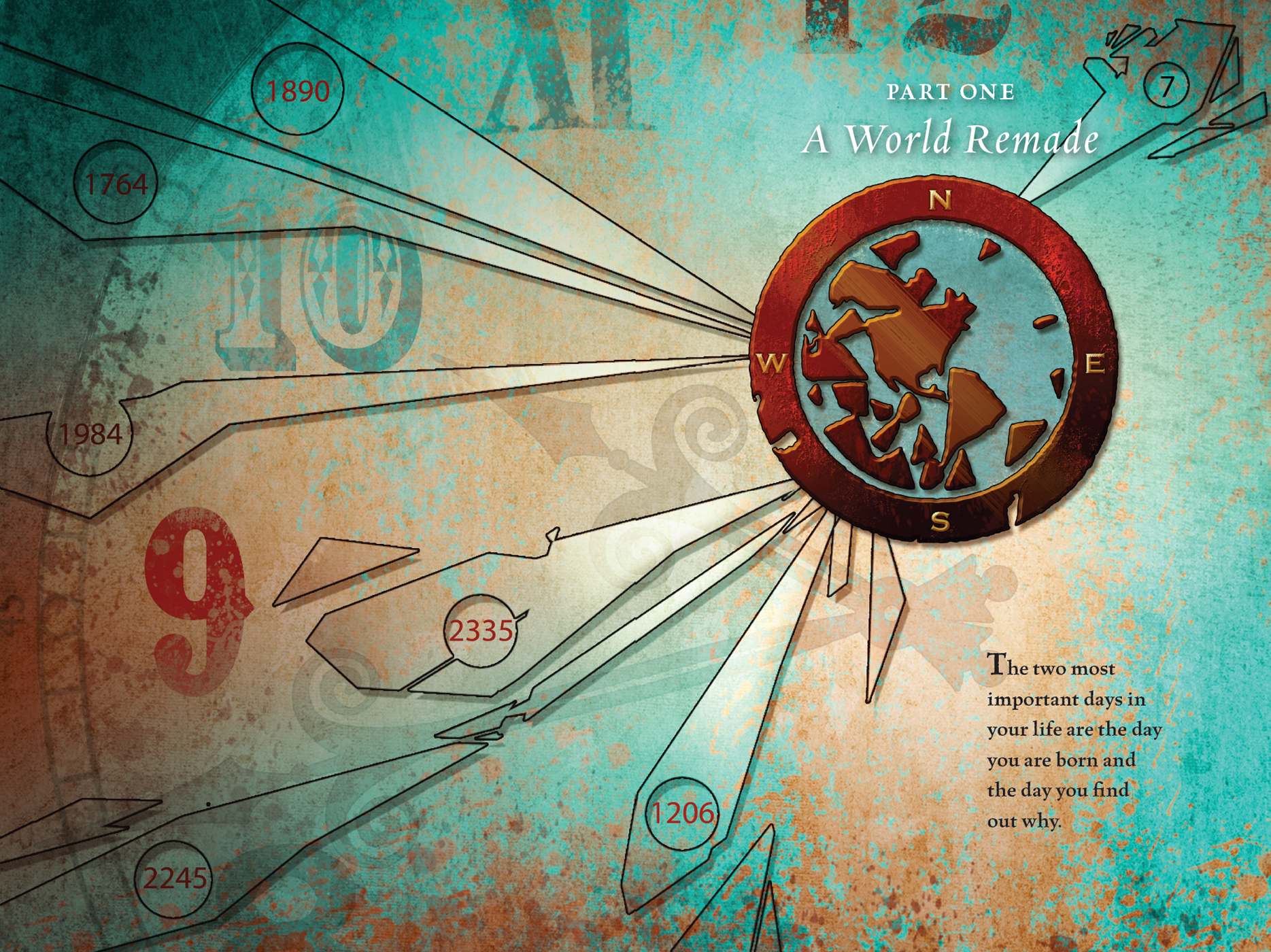
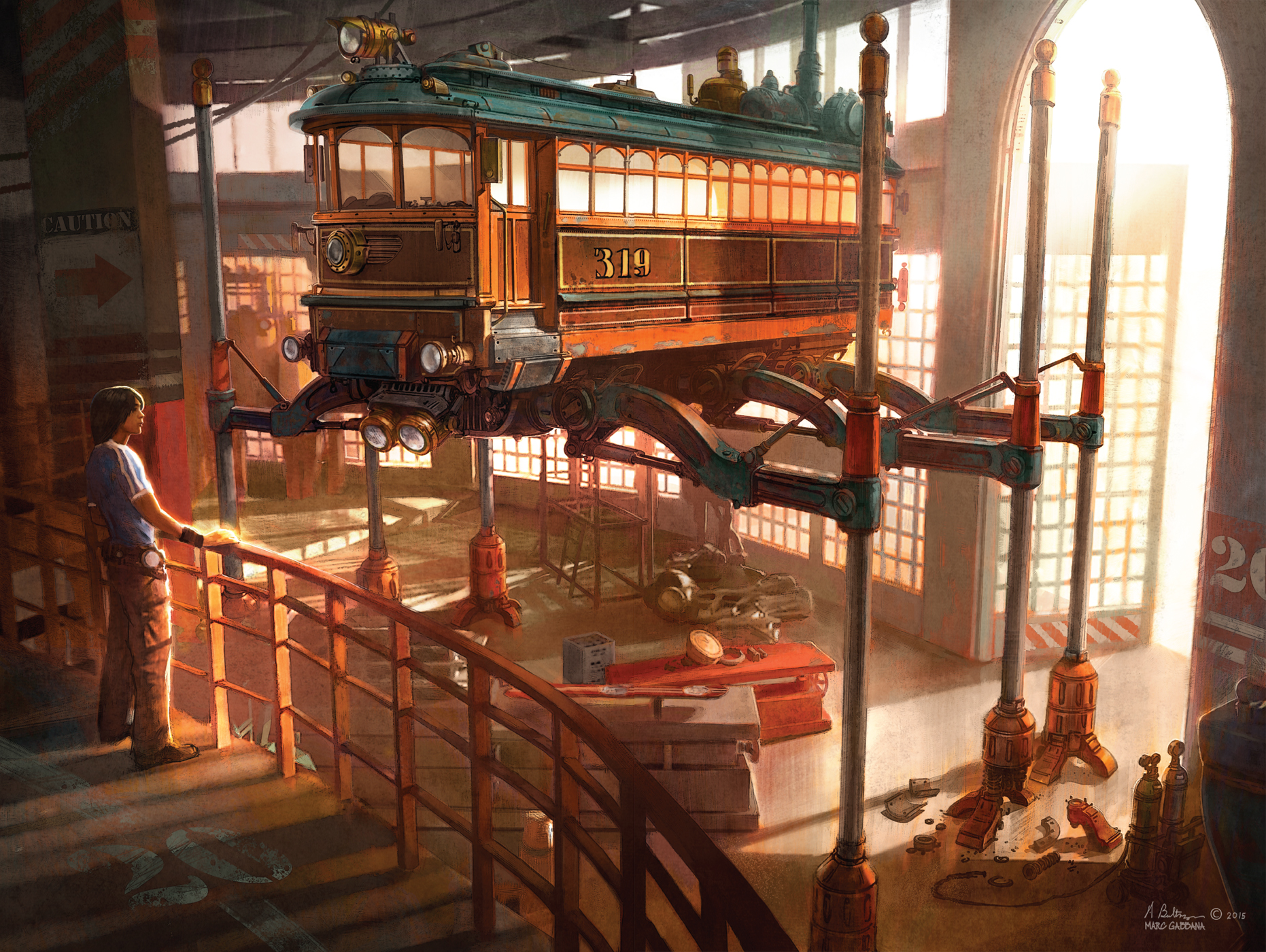
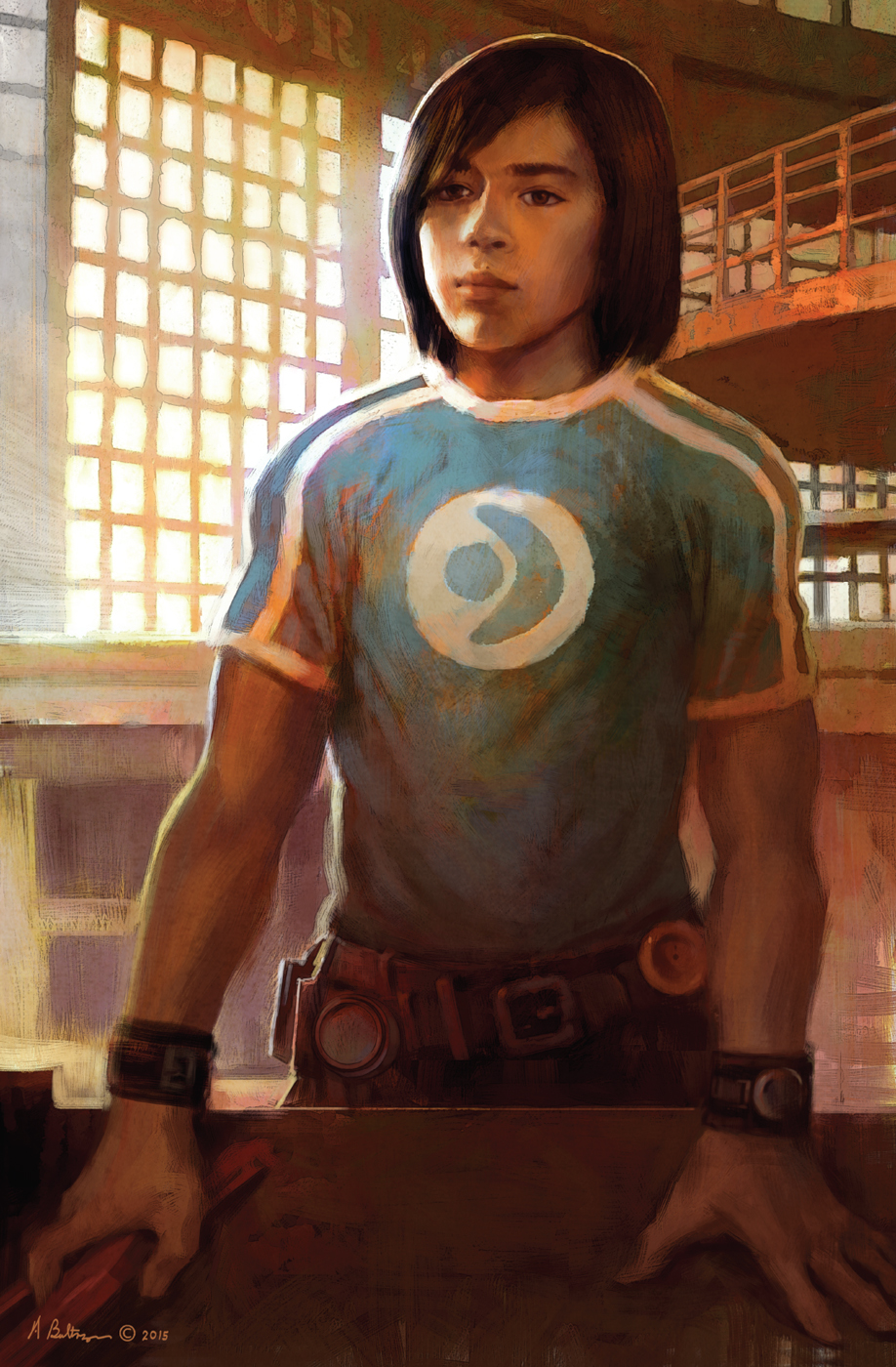

CHAPTER ONE
A Dream of Flight
On the morning of his thirteenth birthday, Diego Ribera glimpsed his future in a dream. It was a dream he’d had before, one that he feared, and it always began with his father calling to him through darkness.
“Diego. We need more light.”
Santiago’s voice echoed through the vast workshop. He stood high on faded blue scaffolding among the enormous robots that ringed the room. He wielded a wrench the size of his arm, and was leaning dangerously far into the oily gears of a massive shoulder socket. The head, arms, and legs of the robot were spread around the floor in various stages of completion.
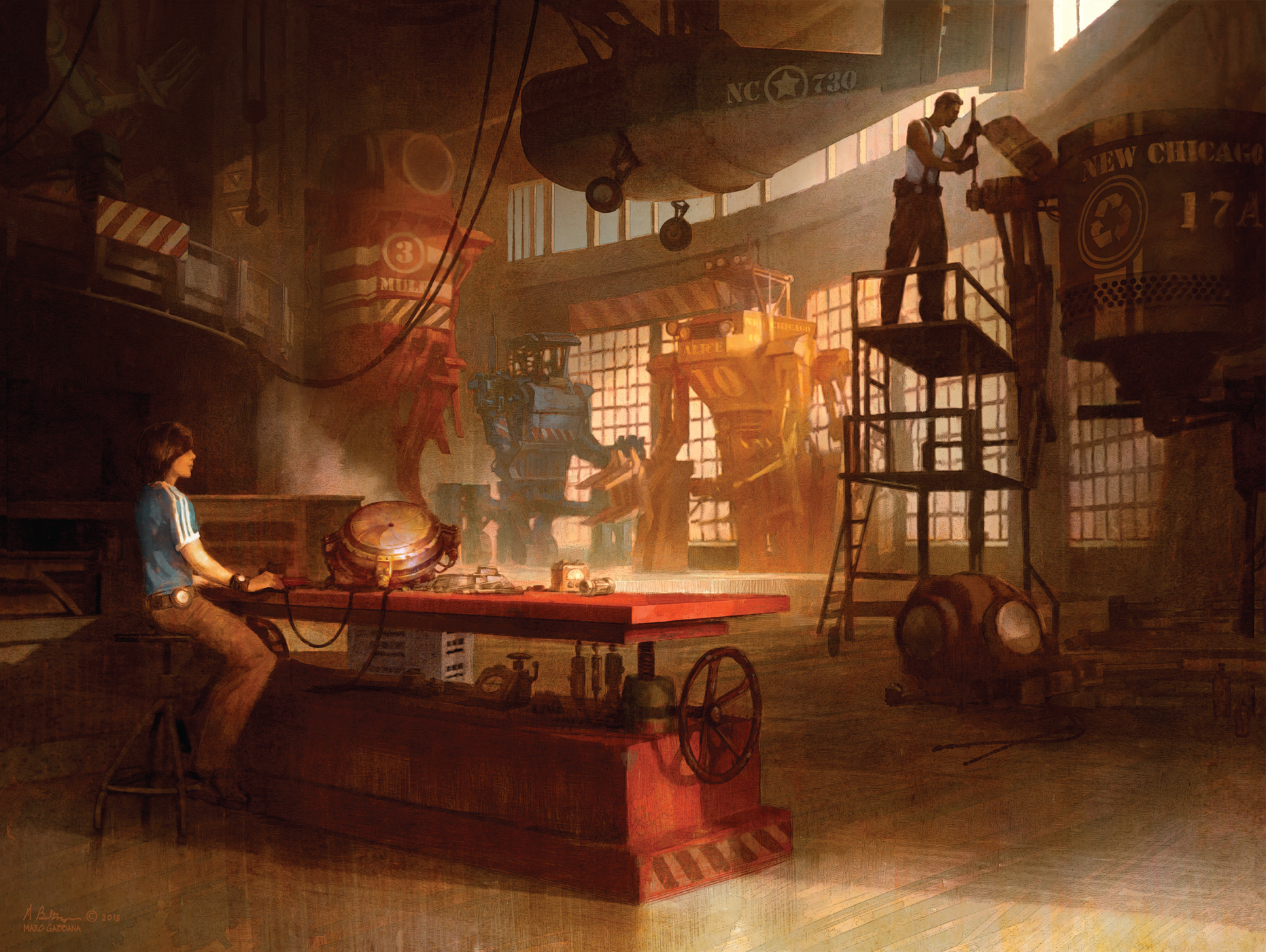
Diego sat on a stool, gazing at one of the robot’s enormous eyes perched on the center workbench. He’d been studying the geometric kinks of its iris. It functioned like a Mid-Time camera aperture. Diego imagined the steel plates sliding open in sequence like flower petals. He pictured the tiny pistons firing one by one, how they connected to the steam processors. He seemed to know how these mechanics would work, sensed their purpose. He wondered if this was how it felt to be his father.
Everyone in New Chicago called Santiago a genius: the greatest mind of the new age. He was a builder, an inventor, a visionary. Some had even called him a charlatan, claiming that his creations were so ingenious that there must be some kind of trickery or fraud at work, but those people had never seen Santiago when he was engrossed in his work.
“Diego, did you hear me?”
“Yeah, sorry, Dad.” Diego slid off the stool.
All at once he was standing at one of the workshop’s towering windows.
Moved without moving.
I’m dreaming, Diego thought, though the awareness was fleeting. The edges of his vision swam in watery darkness.
He yanked the heavy curtains aside. Brilliant morning light spilled into the room.
“Is that enough?” Diego asked over his shoulder.
No answer.
“Dad?”
Diego turned. He found himself back in the middle of the room again. . . .
But Dad was gone. So was the robot he’d been working on. And all the others. No scaffolding, the workshop floor empty in all directions.
Except for the table where Diego had been sitting. The robot eye had also vanished, but now something far more interesting had appeared in its place, gleaming in the golden sunlight.
A gravity board.
Five feet long, made of alder wood, Kevlar, and chrome, and decorated in red and white stripes. The portable steam backpack and navigating gloves lay beside it. Of all his father’s wondrous inventions, the gravity boards were Diego’s favorite. He and his friend Petey had flown them around the workshop on many occasions.
And yet the sight of the board filled him with worry: he’d had this dream before.
The board always appeared right after Dad vanished.
There was danger here, something he couldn’t quite grasp.
“Diego.”
“Dad?” Diego peered into the shadows. But that hadn’t sounded like his father. “Who’s there?”
The disquiet grew in his belly. This may have been a dream, but his fear felt all too real.
He spied a silhouette in the dark space between two windows. The figure stepped into the morning light. Not his father. Shorter. A girl? It was hard to tell. She was wearing thick goggles and an aviator’s cap. She looked about his age.
“Who are you?” Diego asked.
The girl stood motionless. When she spoke again, her mouth didn’t move, her voice instead echoing in Diego’s mind:
Fly.
Then she vanished.
A gust of air.
Diego spun to see the girl leaping out the window.
“No, don’t!” Diego rushed over. He gazed down at the bustling street ten stories below, but the girl wasn’t lying broken on the train tracks, nor floating faceup in the canal. Instead, she was speeding away through the air, on a gravity board of her own.
Fly!
The voice burned between Diego’s temples. He had to move. Had to act.
Diego grabbed the gravity board from the bench. He slung the steam pack over his shoulders. The heaviness of the miniature brass boiler and pressure converter threw him off balance, but he got his feet under him and ran for the window. He slipped on the thick leather gloves—covered in dials and fastened to the pack by slim hoses. He attached the power gauge regulator, flicked switches, and heard the familiar hiss as the boiler cycled up—
And then he was leaping into the sky.
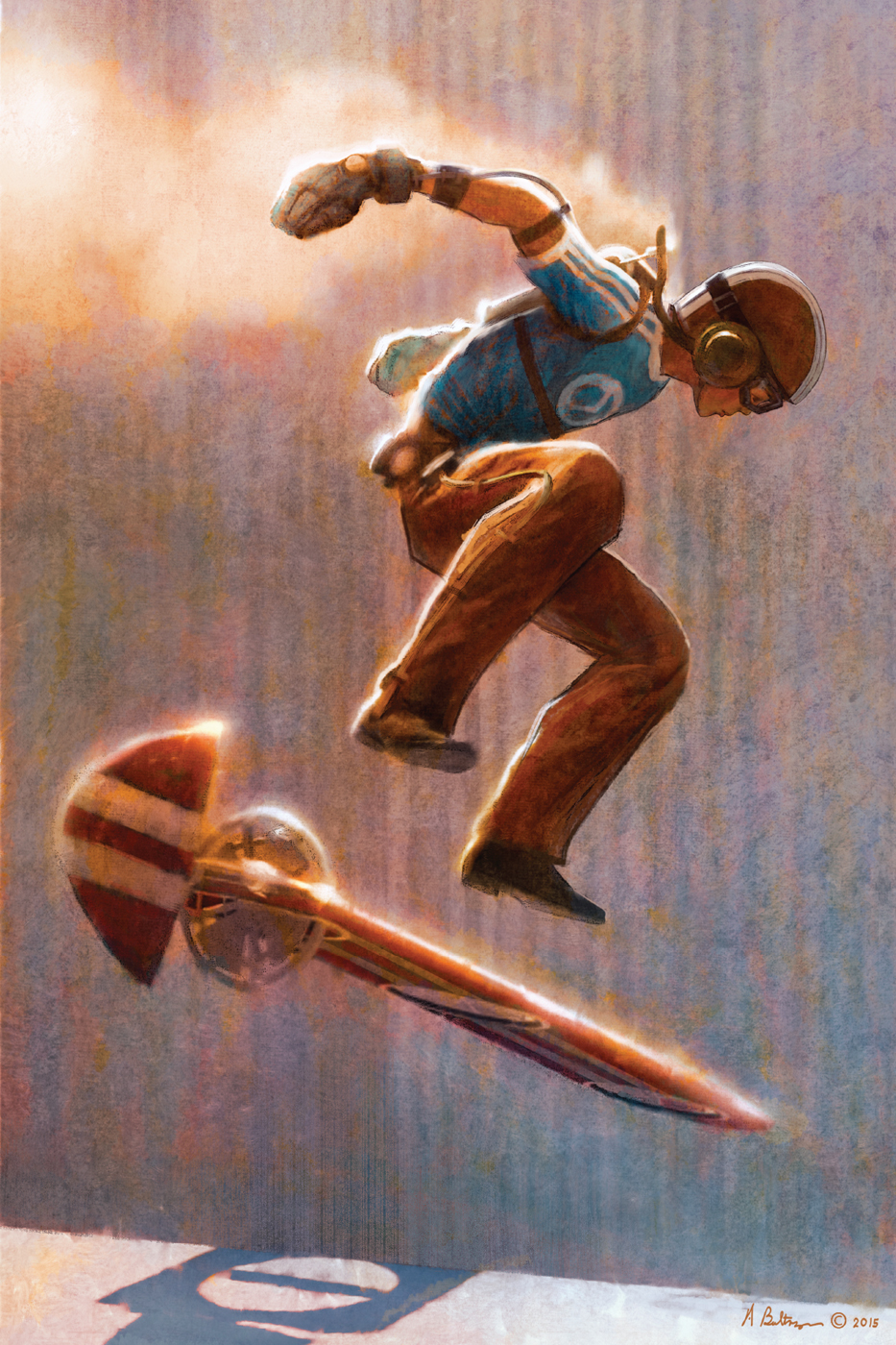
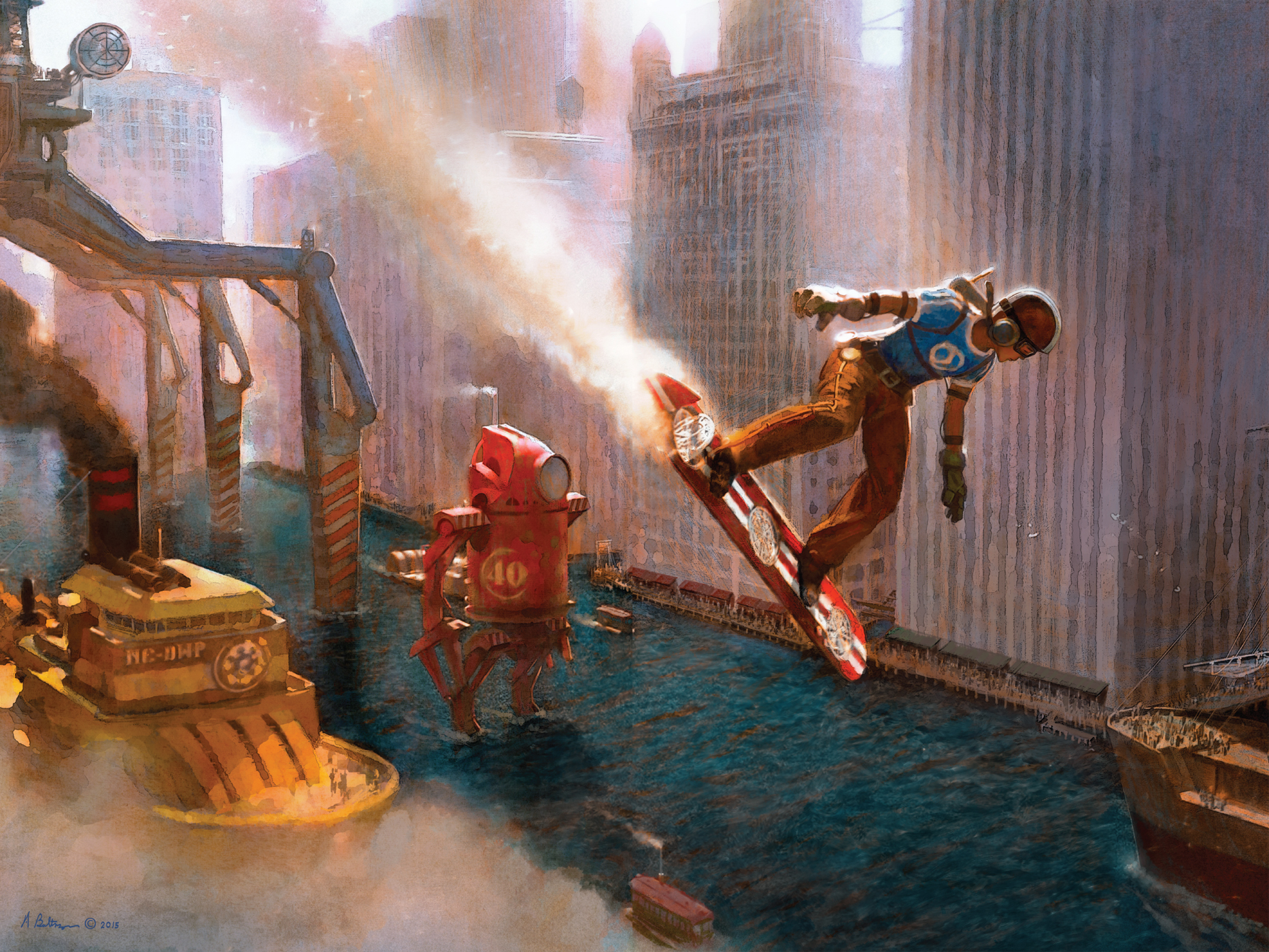
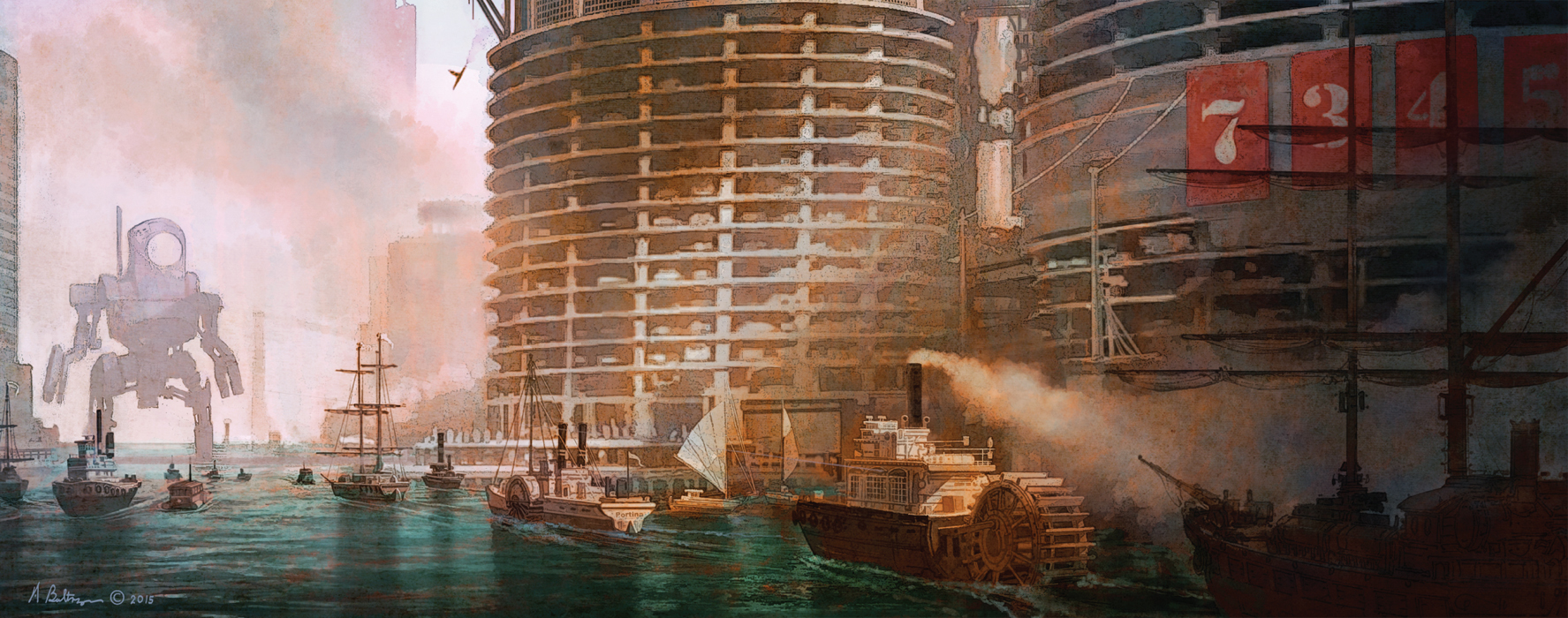
Wind swirled around him. Windows blurred by. Diego hurtled toward the street, but he held the board firm with both hands and slid it beneath his feet. He hit a switch on his gloves, activating the magnet locks, and his boots fastened into place. The busy sidewalks rushed toward him. He pressed hard with his feet, shifted his weight, the ground speeding closer. . . .
The steam turbine whined at full strength, the board dug into the air, and Diego shot forward into a glide, skimming above the shop awnings and the Steam-Time ladies’ high hats.
Diego finally breathed, his face bathed in the breeze. Yes! He felt a shimmering excitement as he soared through the air, a feeling he’d yearned for all his life, one he knew was in his blood.
He pressed the board against the wind, sweeping this way and that. The movements felt as natural as walking, but so much better.
He sped over New Chicago, its canals and train tracks clogged with the morning traffic of steamships and trolleys, its sidewalks crowded with topcoats, leather tunics, and fine capes, a world collided in color and sound, in the smell of horse droppings and engine grease, corn roasting on food carts, and the sea. Off in the distance, the exhaust clouds from the great steamships and harbor robots colored the sunrise gold.
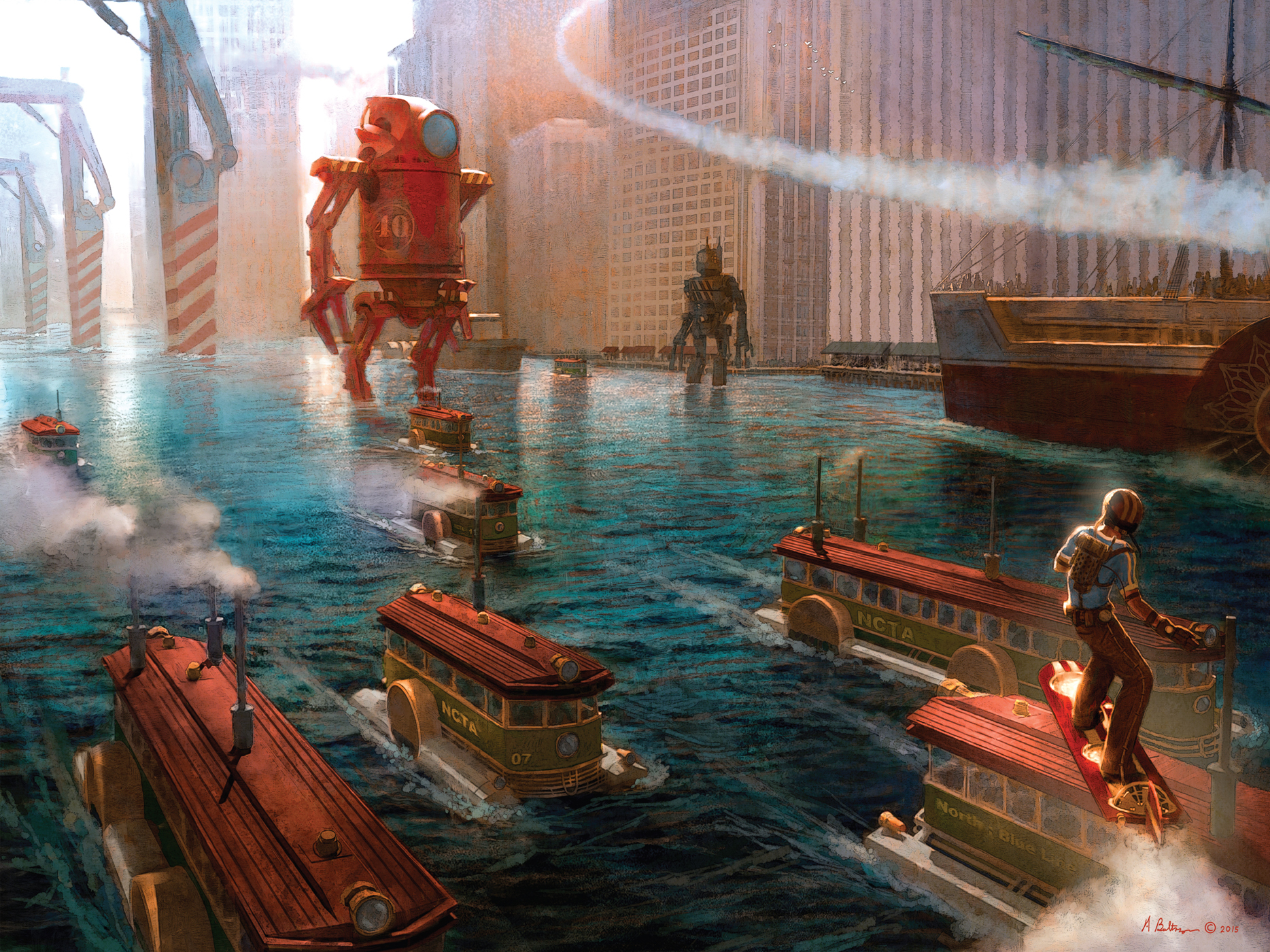
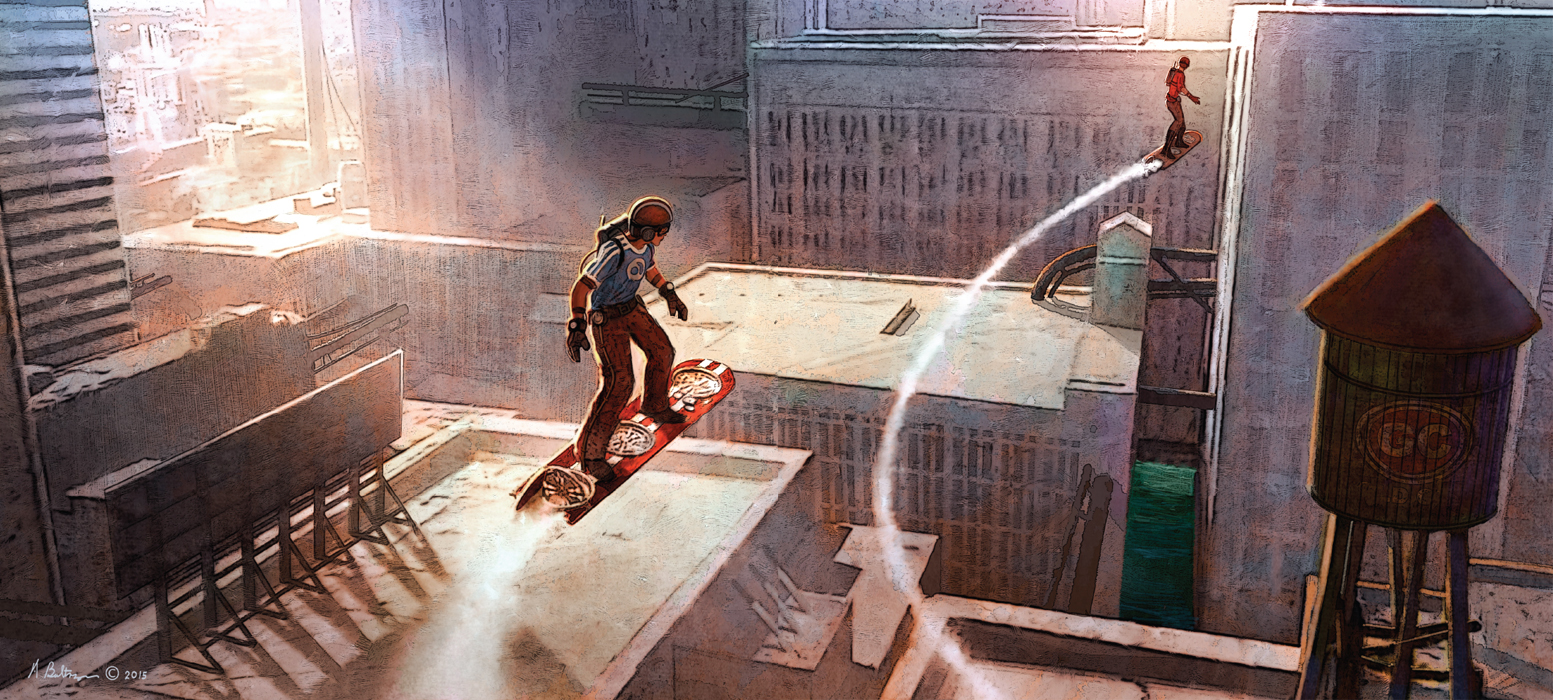
He spotted the girl up ahead, knifing through the sky. He had to catch her before it was too late. Diego didn’t know why, just knew he had to. Something to do with time, he thought. It was always time, running forward and backward through this world, but in this dream . . .
Running out.
Diego was the wind. He was the sky. He felt light as air and knew this was all he’d ever wanted, just like his mom. To fly free.
He spied the girl again, arcing around the next corner. Diego cut the angle so hard that his shoulder glanced off the brick-building wall, but he also edged closer.
If he could reach her, he could pull the main hose on her steam pack and disable the board. He could guide her down to the canal, and then she would be safe.
Safe from what? Diego didn’t know.
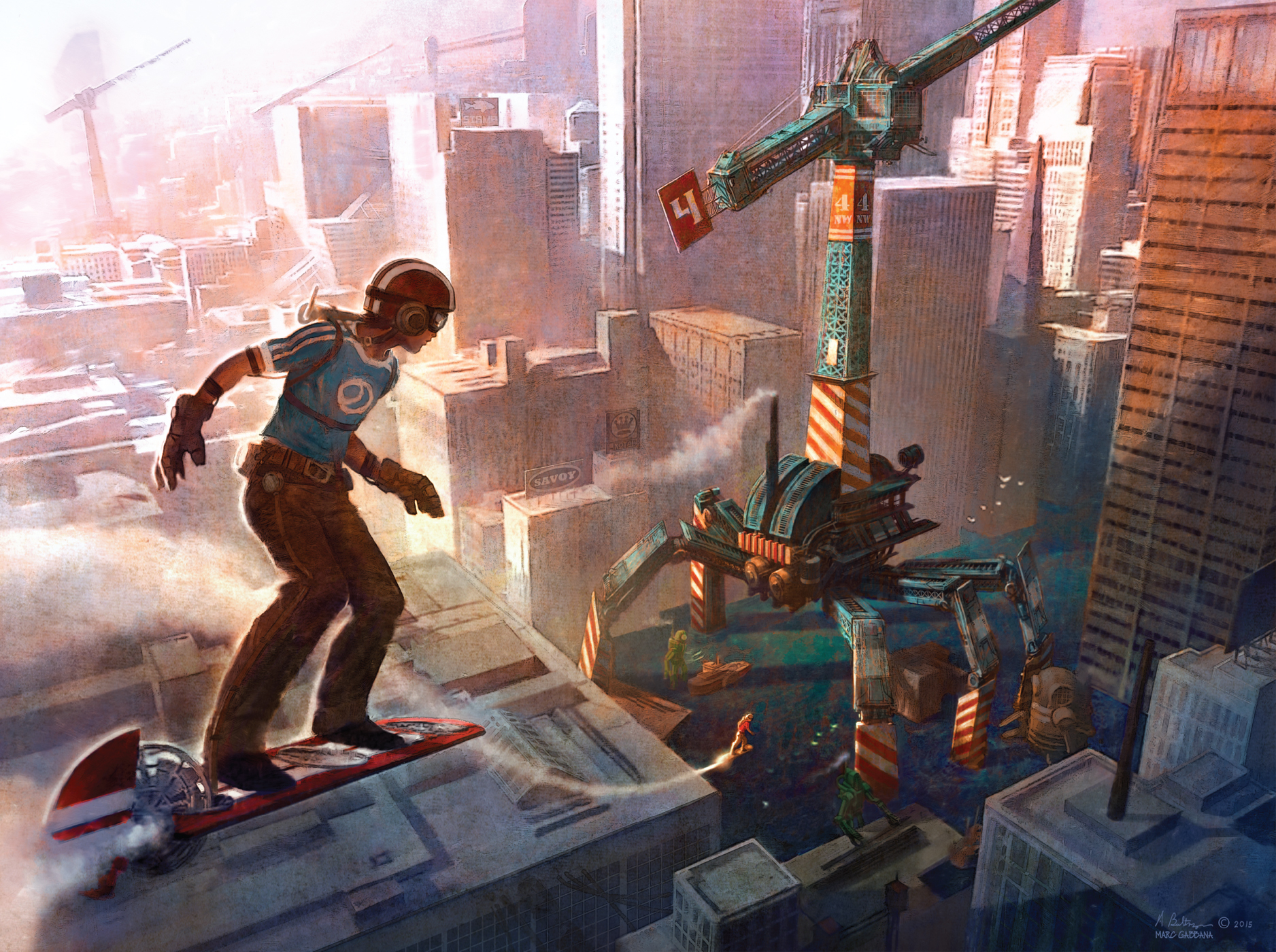
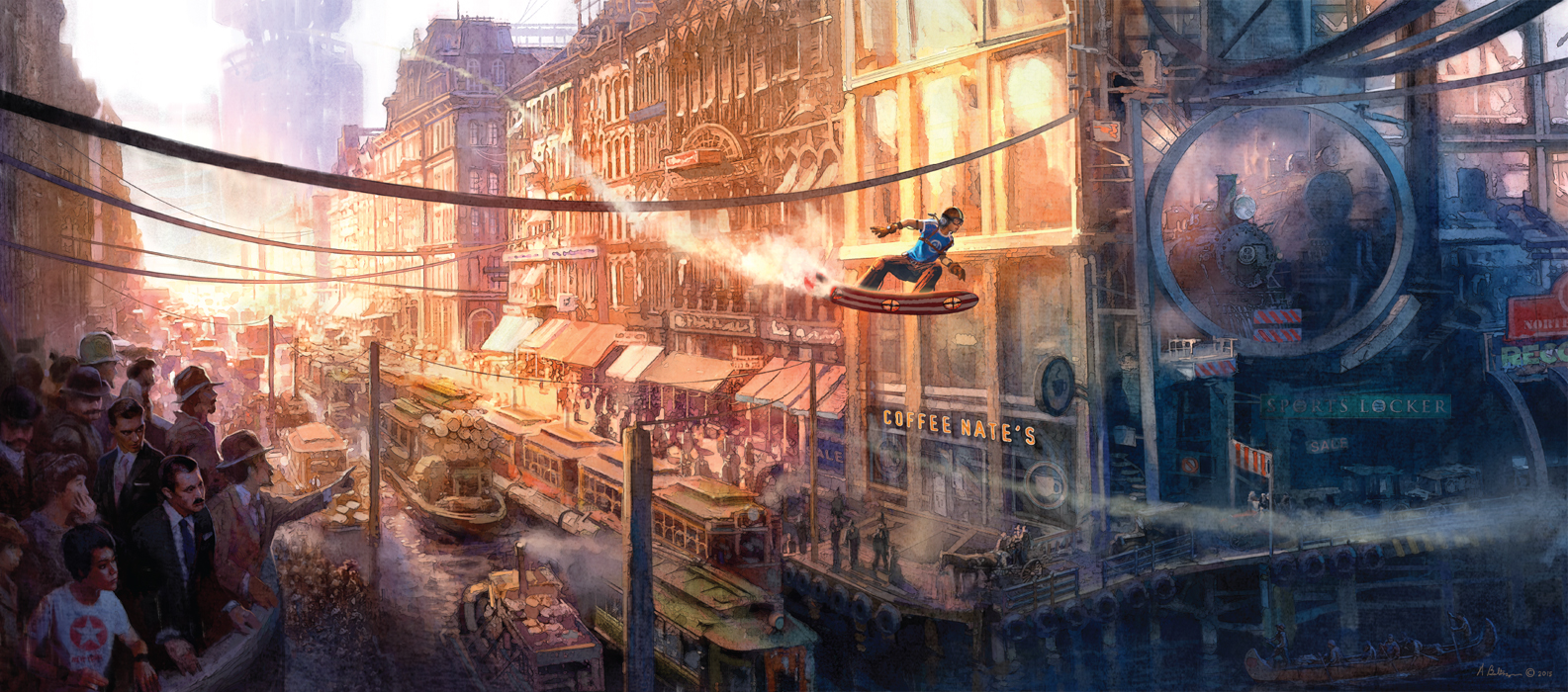
They turned sharply into a wide plaza around City Hall. The building was a grand tower, a mix of Elder and Mid-Time architecture, the plaza a series of floating walkways over water, with fountains burbling in intricate patterns. Diego was surprised to find the plaza packed with people, a huge crowd. More and more were streaming in from all sides, every one of them gazing upward and pointing.
But the timbre of the crowd changed: their gasps shifted from awe to worry. Those who weren’t pointing to the sky were jostling one another, trying to leave.
Diego glanced around for his flying partner, but there was no sign of the girl. She had disappeared.
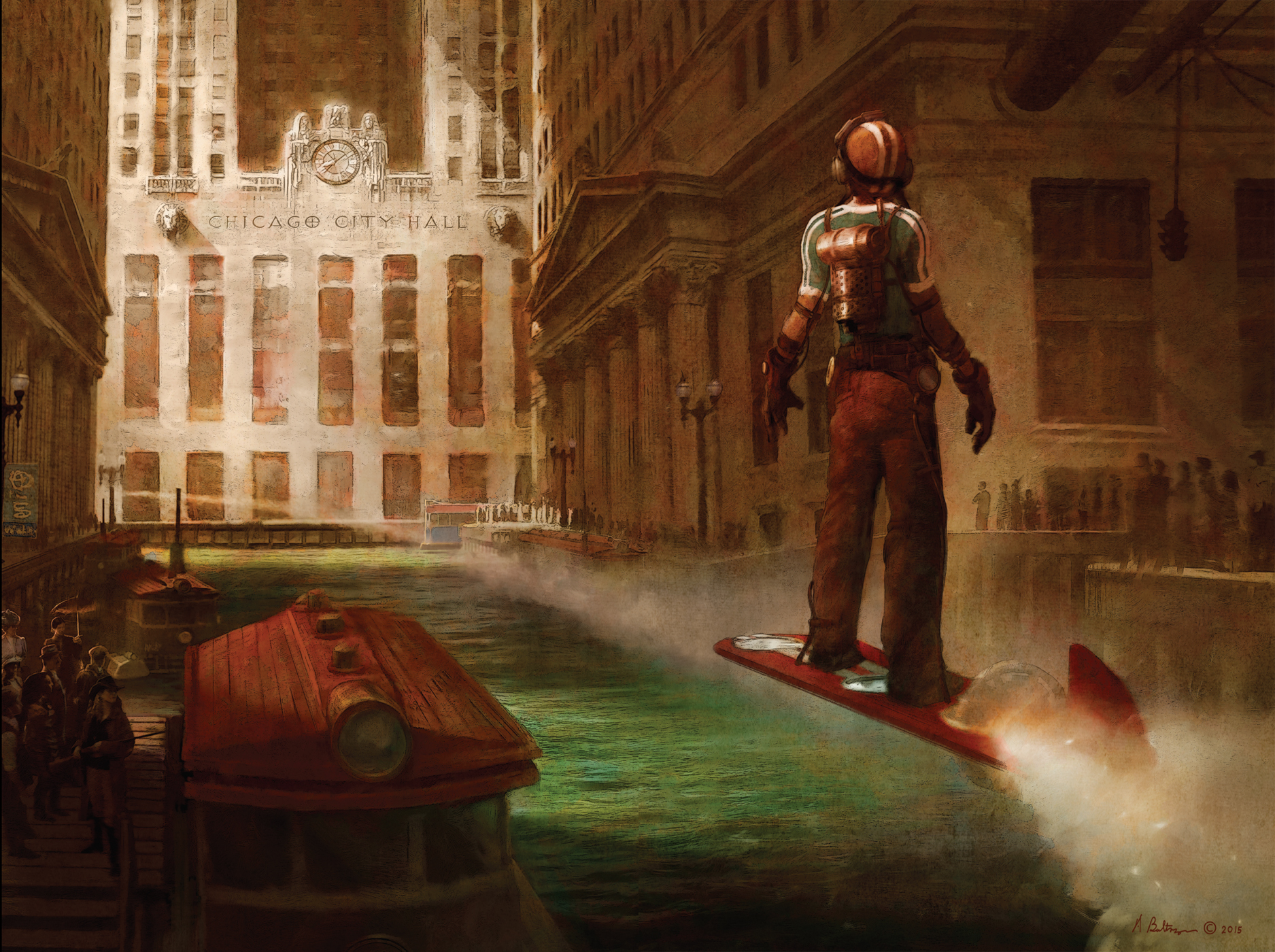
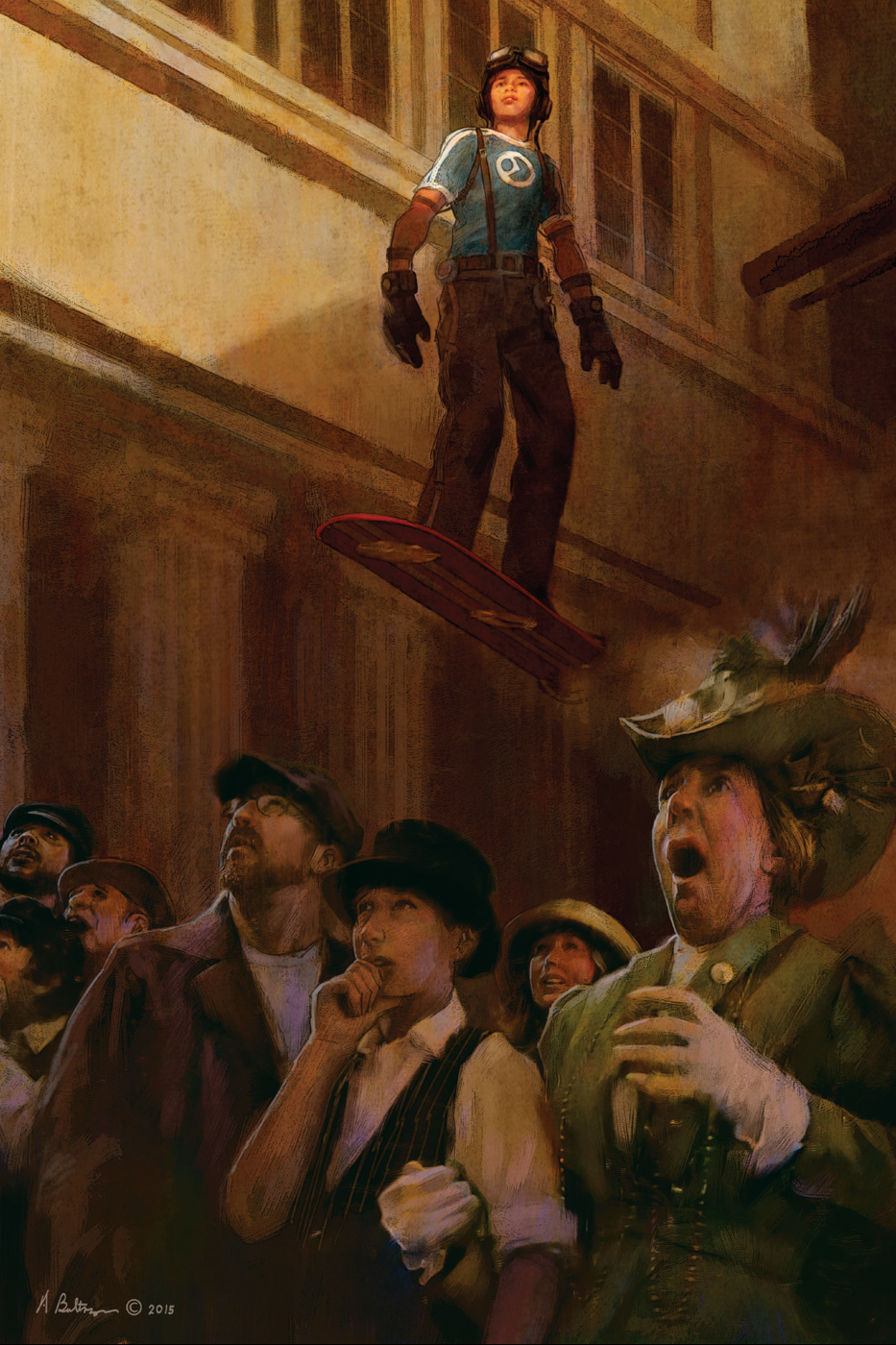
The shouts below turned to screams of terror. Panic. People knocking one another over to get away. Diego followed the pointing fingers to the great clock at the top of City Hall, gleaming in the morning sun.
At first, he thought that the clock must be broken, because the hands seemed to be missing. There were still earthquakes now and then, due to the new fault lines where the earth’s crust had re-fused, but that wasn’t it. The hands were still there; they were just spinning so fast that they had become a blur.
Spinning backward.
The sight made Diego’s vision swim. He had to bend down and grab the sides of the board to keep his balance.
When he did, he saw the empty plaza below. All those people. Gone.
There was no one in the nearby streets either, the tracks and canals vacant, no airships in the sky, no smoke from steamers in the harbor.
It was so quiet. Diego’s breathing echoed in his head. The only other sound was the humming of the clock hands.
Diego’s board began to vibrate. The buildings started to tremble. The clock hands suddenly froze, and the world seemed to halt. Even Diego, his breath caught in his throat, his board stuck in the air—
Then the world began to roar.
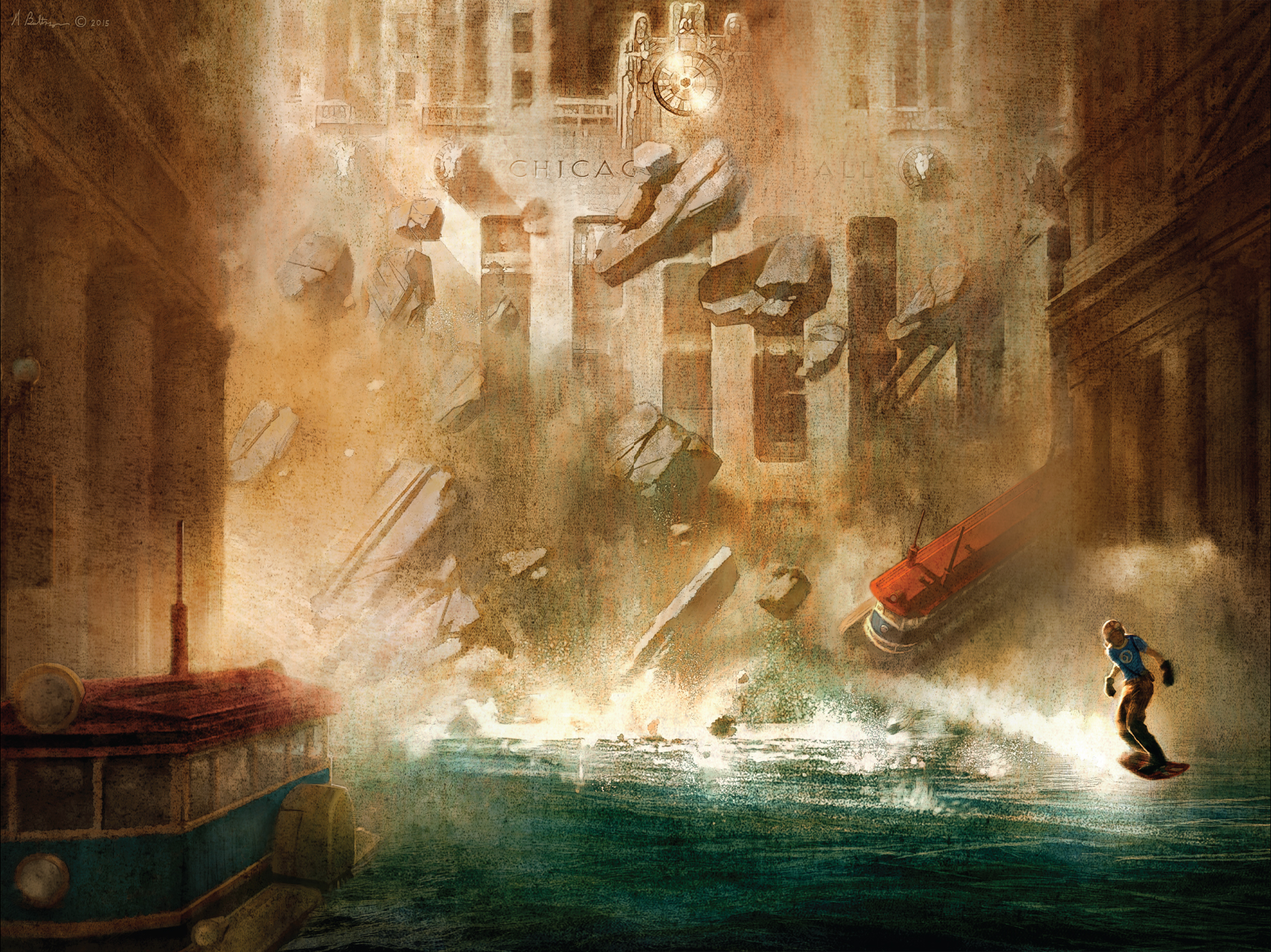
Diego raced away as fast as he could. Water and ash swirled behind him, coming closer. Boats and trolleys rocketed up in the air, thrown by the force of the blast. The sky went dark, clouds and dust all around, swallowing Diego. He lost sight of the sky, the buildings, and . . .
A voice drifted across an infinite wind, speaking a single word as if from a hundred miles away.
“Forward.”

CHAPTER TWO
The Riberas of New Chicago
Diego’s eyes flashed open, the vision of the crumbling city still fresh in his mind.
He blinked and saw a curve of metal overhead, dotted by rivets. The inside of his bed.
Diego breathed deep. It had only been a dream . . . a nightmare. He sat up on his elbows, careful not to bump his head inside the old propane tank that his dad had converted to look like a Mid-Time–era submarine. The bed had been a present for Diego’s eighth birthday. These days, his feet reached to the far end when he slept.



